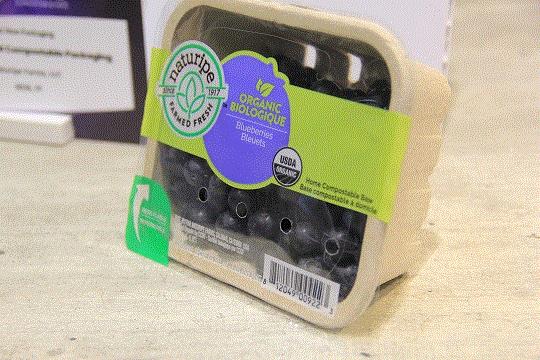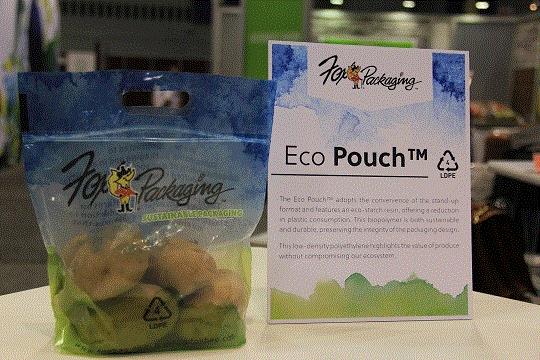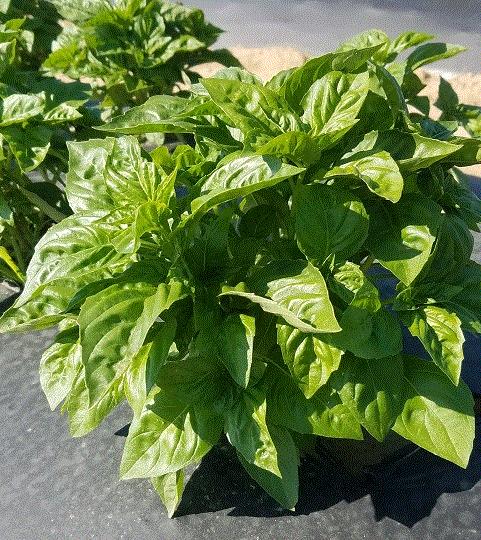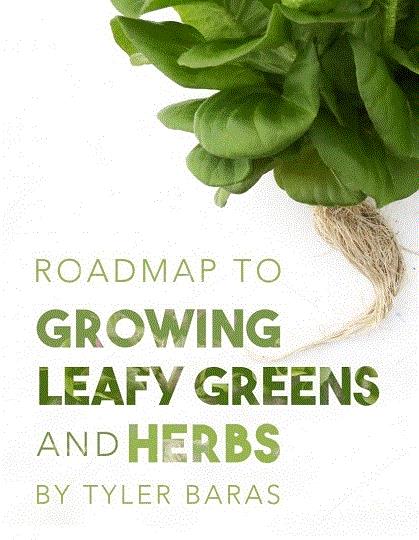Thoughts on Plastics
Plastics have been in the news, particularly ocean plastics. So when I hit the floor at United Fresh a couple of weeks ago, I was determined to find plastic alternatives. What I found is the plastics discussion is a lot more involved and more complex (of course) than I initially thought.
In a talk called "The Future of Packaging," Nico Shaut, technical sales and service from Next Generation Films in Ohio, said the topic was top of mind for everyone at the show. “It’s at the forefront of every conversation we have with suppliers and customers,” he noted.
The bad news, he said, is only 9.1% of virgin material is recycled in the U.S., while the rest goes to a landfill. Flexible packaging, like the kind his company makes, can’t go in the typical recycling stream (it gets caught up in the automated sorting machines).
However, on the flip side, when you compare flexible packaging to clamshells, flexible packaging manufacturing requires less fossil fuels and resources (per this fact sheet). Flip it again and consumers feel more comfortable with clamshells because they're more confident in their ability to be recycled (some communities, like mine, don’t take them, but many others do).
On the flexible packaging side, many brands are promoting the How2Recycle website, which has a store locator where consumers can take their plastic bags for recycling (I take mine to my local grocery store).
While walking the floor, I did see some compostable packaging options, too. NatureFresh Farms introduced theirs a couple of months prior at a show and highlighted it again at United Fresh. NatureRipe Farmed Fresh was a best new packaging nominee for its Peel & Reseal Pulp Fiber Trays for blueberry packaging. The trays are home compostable. These are starting to become more prevalent among the snacking fruit companies.

NatureRipe Farmed Fresh's Peel & Reseal Pulp Fiber Tray.
Fox Packaging highlighted its Eco Pouch, which is a stand-up format made from an eco-starch resin. “This biopolymer is both sustainable and durable, preserving the integrity of the packaging design,” company material states.

Fox Packaging's Eco Pouch. Eco
Want to weigh in on this ever-present topic? Shoot me an email!

Rutgers' New Basil
Researchers at Rutgers University have come up with four new sweet basil varieties that are resistant to downy mildew. The four varieties—Rutgers Devotion DMR, Rutgers Obsession DMR, Rutgers Passion DMR and Rutgers Thunderstruck DMR—are now available to commercial growers and home gardeners.
Here’s the rundown on their attributes, according to Rutgers All-Star Varieties website:
-
Rutgers Obsession DMR: Sweet basil for field and potted plant production; vigorous growth, high leaf-to-stem ratio, dark green color, highly resistant to fusarium wilt
-
Rutgers Devotion DMR: Genovese-type basil for potted plant production and fresh market; uniform, upright growth and dome or cup-shaped leaf
-
Rutgers Thunderstruck DMR: Sweet basil primarily for field production; medium-sized, slightly ruffled leaf with bright green color
-
Rutgers Passion DMR: A beautiful sweet basil for potted plant and field production; exhibits vigorous growth with a high leaf-to-stem ratio; ability to regrow after many harvests over a season and slightly cupped leaf of a greater size compared to Rutgers Obsession DMR

Rutgers Obsession DMR/Photo Credit: Andy Wyenandt
Three researchers led the team that developed the new basil varieties: James E. Simon, a distinguished professor of plant biology in the School of Environmental and Biological Sciences at Rutgers-New Brunswick; Robert Pyne, a former doctoral student; and Andy Wyenandt, an associate extension specialist in vegetable pathology at the Rutgers Agricultural Research and Extension Center near Bridgeton. The team also included collaborators in Florida and on Long Island.
James says the plants are vigorous and can be cut and harvested many times over many months. Those interested in learning more about the basil breeding program or finding sources for purchasing the seed can visit the Rutgers New Jersey Agricultural Experiment Station’s All-Star Varieties website.

FDA's New Sprouts Draft Guidance
Sprouts are a tricky crop, as they can be susceptible to a wide variety of bacteria through the supply chain, including E. coli, listeria and salmonella. The U.S. Food and Drug Administration (FDA) recently released a proposed draft guidance called “Reducing Microbial Food Safety Hazards in the Production of Seed for Sprouting.”
The goal is to make the sprout seed industry—from growers through packers, holders, suppliers and distributors—aware of the agency’s “serious concerns” with the continuing outbreaks of foodborne illness associated with the consumption of raw and lightly cooked sprouts.
“Over the past 22 years, the FDA has investigated 50 reported outbreaks of foodborne illness associated with contaminated sprouts. Together, these outbreaks resulted in more than an estimated 2,600 cases of illness. Last year, there were two reported outbreaks associated with sprouts, resulting in more than an estimated 100 illnesses,” says FDA Deputy Commissioner for Food Policy and Response Frank Yiannas. “Studies indicate that contaminated seed is the likely source of most sprout-related outbreaks, as this commodity is inherently more susceptible to these issues because they are grown in warm and humid conditions that are favorable for bacteria like salmonella, listeria and E. coli.”
The guidance includes recommendations for best practices for sprout handling and how members of the supply chain can review their current operation. During the 60-day comment period for this draft guidance, stakeholders will be able to provide comments on the draft provisions. CLICK HERE to see the draft document and submit comments online.

Leafy Greens Roadmap from HortAmericas
A couple of years ago when I first started on Inside Grower, I interviewed a young grower who had just come onboard with HortAmericas to run a demonstration greenhouse in Texas and come up with a guide to growing leafy greens in the same vein that HortAmericas had already done for greenhouse tomatoes. Well, it’s here: Tyler Baras has completed the “Roadmap to Growing Leafy Greens and Herbs.” It’s available HERE from HortAmericas in paperback and ebook for Kindle versions.
The book isn’t just about the growing aspect, though. It’s about the financial investment, as well, and highlights topics like site selection, structure and growing system selection, lighting, nutrients, substrates and more.

“Experience is the best teacher. This book is based on my experiences in commercial hydroponic leafy greens production and I hope to transfer some of the practical knowledge I’ve gained,” Tyler says in an intro on the HortAmericas website. “I graduated Cum Laude from the University of Florida Horticultural Sciences Department, but that didn’t come close to preparing me for the realities of commercial hydroponic farming. You can read ‘buy a backup generator,’ but that doesn’t come close to the experience of seeing a farm face massive crop losses due to multiple power outages.”

Cultivate'19 Quick Hits for CEA
Here are just a few sessions/tours/workshops I pulled out from the schedule that relate to CEA coming up fast (!) at this year’s Cultivate’19 in Columbus, Ohio. The dates are Saturday, July 13 to Tuesday, July 16. Again, these are just a few on the technical side that relate—there are many more related to business, finance and HR that could also help your operation. Add on means there's an extra charge and the educational sessions are a different package from the trade show admission. Click the link above to find out more.
Saturday
-
Biocontrols Workshop 8:00 a.m. to 5:00 p.m. (add on)—Attendees learn how to make their biocontrols programs stronger with best practices from experts like Suzanne Wainwright-Evans, Buglady Consulting; John Sanderson, Cornell University; and Rose Buitenhuis, Vineland Research & Innovation Centre. An offsite greenhouse experience is included.
-
Research Innovation Tour 1:00 p.m. – 5:30 p.m. (add on)—I will be on this bus, heading to Scotts Miracle-Gro where they'll talk about some of their recent innovations. One of this highlights of this tour is a focus on indoor gardening.
-
Safe & Effective Biocontrol and Environmental Strategies for Successful Herb & Basil Production 1:30 - 2:30 p.m. Room A220
Sunday
-
Importance of Algae Control on Hard Surfaces & Crops 10:45 – 11:45 a.m. Union Station Ballroom A
-
The Challenges of Greenhouse Strawberry Production 1:30 – 2:30 p.m. Room A220
Monday
-
Introduction to Mushroom Cultivation 2:45 – 3:15 p.m. Live for Growers stage
-
Growing With LEDs in the Greenhouse: Grower & Academic Perspective 4:00 – 5:00 p.m. Room A220
Tuesday
-
Leafy Greens 101: How to Start and Optimize Your Hydroponic Production 9:30 – 10:30 a.m. Room 213
-
Small, Medium and Large Scale Commercial Production 10:45 – 11:45 a.m. Room A220




As always, feel free to email me at jpolanz@ballpublishing.com with comments, questions, news and views.
Until next time,

Jennifer Polanz
Editor-at-Large
Inside Grower
This email received by 27,230 loyal readers!
Interested in advertising in Inside Grower? Contact Paul Black or Kim Brown and they'll show you how easy, effective and affordable it is.